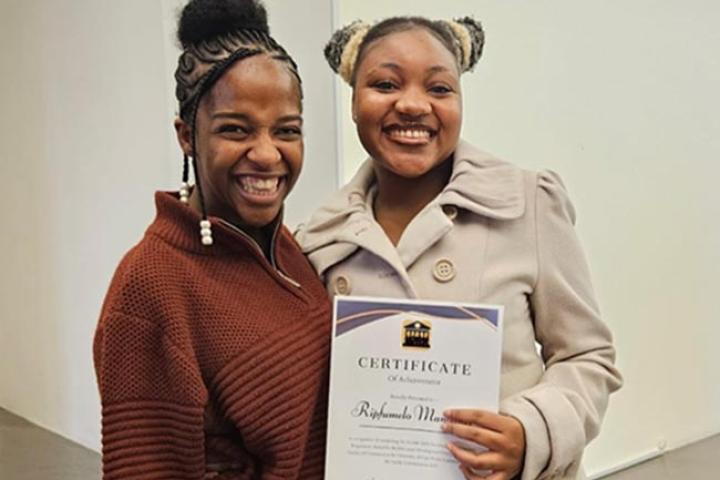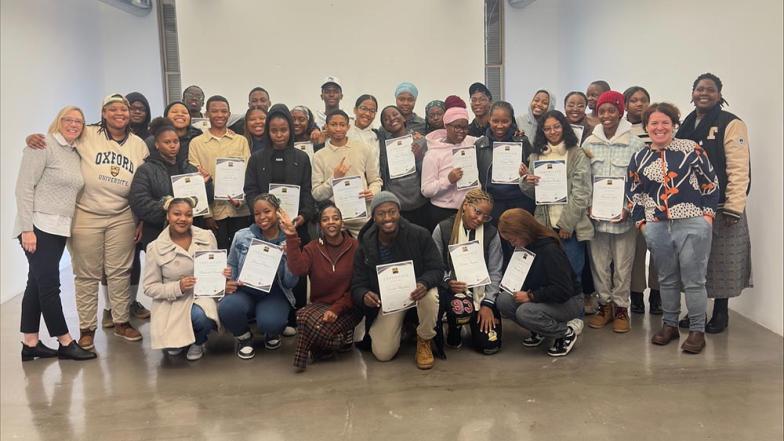Why go alone when you can go together?

EDU students received certificates at the closing ceremony for the Sisonke Programme.
Story Nicole Forrest. Photos Supplied

The Sisonke Programme is an initiative dedicated to fostering connection, community, and student well-being within the faculty.
On 11 March, the University of Cape Town (UCT) Faculty of Commerce Education Development Unit (EDU) launched the Sisonke Programme in partnership with The Saville Foundation (TSF), aiming to foster connection, community and student well-being within the faculty.
Many university graduates look back on their student days with fondness. These years are usually remembered as some of the most carefree of their lives. The incredible amount of hard work and stress that comes with studying towards a degree – especially in a world where post-university job prospects seem to be dwindling – become footnotes in great campus stories.
However, recent research published in the journal BMC Psychology shows that nearly three-quarters (73.2%) of university students are moderately to highly stressed and nearly one-third (28.2%) reporting frequent symptoms of burnout.
While small doses of stress can be healthy, helping to increase motivation and sharpen concentration, prolonged stress can lead to a loss of productivity, quality of life and overall health.
To help combat this issue in the Faculty of Commerce, the EDU devised the Sisonke Programme, an initiative that specifically targets the needs of Commerce students by offering personalised resources created to help them thrive academically, socially and mentally during their university journey.
Run by EDU Student Facilitator Khabo Mthembu and TSF Student Development Consultant and entrepreneur Mo Malele, the programme featured four online sessions aimed at helping students stay focused, set goals, deal with failure and pick up tips and tricks for academic success.
A toolbelt for triumph
Sisonke is about more than just academic success; it’s aimed at providing a space where students can connect, share experiences and develop essential skills for their holistic development.
“What we normally think about when it comes to success is students being equipped to survive university, but that’s about more than getting by academically. So, with Sisonke, we wanted to focus on how we can help these young people holistically develop outside of the lecture halls and be prepared to tackle ‘real life’,” Khabo explained.
“In the EDU, we know that it takes a village to raise a graduate. We know that a lot of student success hinges on community and that’s where Sisonke, which literally means ‘we are together’, came from. Our focus was on how we can bring a sense of community to senior students so that they don’t end up feeling isolated and end up caving under the pressure.”
Mo seconded this, emphasising that helping students to build a community not only spurs academic successes, but also equips them to deal with the challenges they’ll be faced with after leaving university.
“I always say that if you went to university and all you came out of that experience with was a degree, then you missed the point. There are so many other things that an institution of higher learning has to offer other than just that piece of paper,” added Mo.
“For us, Sisonke is about that. It’s about helping students to develop as people, as citizens and as human beings, because we want to help graduates to develop the attributes like empathy, compassion and ability to reflect that equips them to become great leaders and role models.”
Creating a supportive environment
To foster a culture of support and inclusivity within the commerce faculty and create this sense of belonging while also equipping students with tools and strategies to manage academic demands, the convenors developed Sisonke with a focus on reflective, peer-to-peer learning.
“The core goal was to have students finish the programme feeling empowered and connected. By digging into issues like failure and isolation, and then encouraging the students to share their own experiences, really made everything come to life and showed the participants that they’re not alone, that other people are also navigating these challenges too,” Khabo said.
“It was great to see that students weren’t just attending, either. They were fully showing up and sharing personal stories. They really dug deep. They shared about where they've been, where they are and where they want to be, holding space for each other, witnessing each other and just offering genuine support for one another.”
In addition to attending the virtual sessions, students were also required to compile a reflective portfolio where they catalogued what they learnt during a session and how they could implement this in their day-to-day lives.
“We asked students to take notes and create their own reflective portfolio in any format – poems, music, normal written documents, anything – to take a step back and think about what they were learning, how their perspectives are changing, how they’re building and growing,” said Mo.
“It was all about forcing students out of their comfort zones by bringing them into the learning process and encouraging them to take control of it. We wanted to bring the lessons to life and show them that they’re not alone, that everyone faces challenges and that putting things on the table and talking about them does help.”
A collective success story
While it will take a while to see the impact of the programme in numbers – i.e. how many students who participated improve their marks or pass the year – Khabo noted that the true success was the ability to bring students together and show them the power of the collective.
“If we’re able to raise young people who are intentional about taking care of themselves and being connected with their community, I think we’re going to see a generation of young Africans who can change the narrative and the story of our society for the better,” she said.
Head of Commerce EDU and Senior Lecturer Carla Fourie echoed this sentiment, emphasising that the programme was as much about connection and community as it was about academic support. She explained that the real value lay in creating an environment where students could develop the confidence to take charge of their learning and well-being.
“The Sisonke Programme was created to respond to the need for deeper connection, belonging and well-being among commerce students navigating a demanding university environment. Its structured yet flexible approach offered students a safe and inclusive space to reflect, build self-awareness, and strengthen personal agency,” she noted.
“The reflections gathered show meaningful shifts in students’ self-management and overall engagement, with many taking greater ownership of their academic and personal journeys. The commitment and care shown by Mo and Khabo were central to the programme’s success, helping students feel truly heard, seen and supported.”